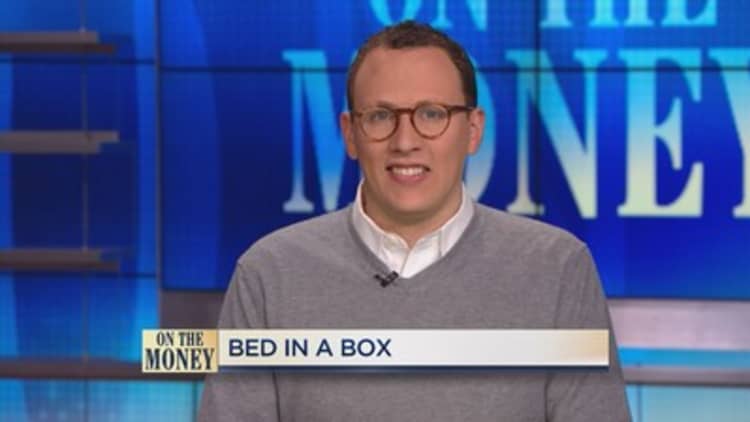
Choosing a mattress sounds simple, but for some it can be a nightmare. The sheer range of prices and the number of options can be daunting.
It's one reason why mattress startup Casper sells just one model in all six standard sizes—to help simplify the buying experience. Prices range from $550 for a twin up to $1,150 for a king size.
Last week, the company's chief explained to CNBC why he felt the pain of consumers overwhelmed by the task of finding a new bed.
"Buying a mattress in a mattress store ranks as one of the worst consumer experiences still in existence," Casper CEO and co-founder Philip Krim told CNBC's "On the Money" in an interview. His company has positioned itself as a disruptor in an industry that sees an estimated $14 billion in annual turnover, according to data from IBIS World.
"Laying on a mattress in your street clothes for fifteen seconds and making a decision if it's right for you, it's kind of perverse. People hate that," Krim said. "They hate that a commissioned sales person is going to stand over you and try to sell you something," he added.
When Krim and his partners launched the online startup in 2014, he said they knew that "if we wanted to offer a great experience, we had to allow customers to avoid the store and let you peruse and learn about the products online."
For that reason, Casper offers free shipping, delivering a mattresses compressed in a box within 2-5 business days that can be tried free for 100 days.
"We also believe the only way to know if a mattress is right for you is to try it at home," Krim said. If a client doesn't like the mattress, the company will pick it up and donate or recycle it.
Less choice, more comfort
Casper's disruptive model helped it sell $100 million in mattresses in 2015, and it doubled that figure last year. He told CNBC this year's projections are "meaningfully above last year's," but declined to comment further.
Karim said the industry average for a mattress lifespan is 7 to 10-years—but Casper has a 10 year warranty. "We test it to last at least 20 plus years," he added.
Casper is just one of a growing field of upstarts trying to help consumers sleep better at night. Saatva, Tuft & Needle, Leesa are among competitors that sell online, also offer free shipping and lower prices than traditional mattress makers. Even mattress giant Temper Sealy launched "Cocoon", a direct-to-consumer mattress brand.
Yet instead of having multiple mattress designs and firmness options, Casper only offers only one. Krim called the model a "universally comfortable" one that uses memory foam and a "springy comfort layer" made in the USA.
Part of the confusion of retail mattress is what Krim called the "paradox of choice."
"The reality is stores use that as a trick to think that you have to go in but there's no reason you need 70 different things that all look the same," Krim said, offering hotel beds as an example.
"When you check into a hotel, they don't say, 'Oh, what kind of mattress do you need?' and have you fill out a really complicated matrix of firmness," he added.
Beyond mattresses, Casper has expanded into selling sheets and pillows, while moving into other retail outlets like West Elm.
The company is also dabbling in keeping pets happy, by selling dog mattresses.
"We found the most popular pictures posted on Instagram were people unboxing the mattress and their dog comes and sits on it," Krim said. "We were joking, we should make one for dogs."
After doing some research, Krim added, that joke became a new product line. Casper's canine beds range from $125 for small dogs to $225 for a large.
"It took us months to develop it, but people love it and dogs love it."
On the Money airs on CNBC Saturday at 5:30 am ET, or check listings for air times in local markets.



